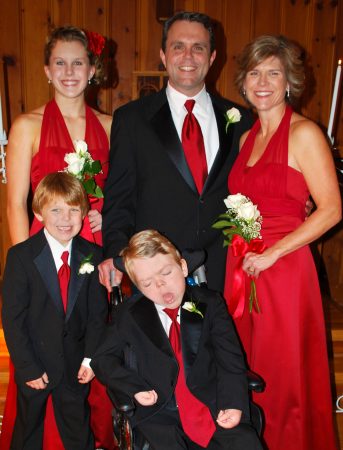Angela and Byron are adjusting to their new definition of family as Davis was now living full-time at Bethany Children’s Health Center (BCHC).
The beginning of Angela’s story can be found here, here, here, and here.
Life without Davis at home
The first few months after Davis moved were definitely an adjustment. Angela found herself still getting up in the middle of the night like she usually did to give Davis his breathing treatment or to change him, etc. Her body had been getting up at 2:00 am for so long, that it would take some more time before she stopped automatically waking up. Even not hearing the oxygenator was an adjustment. They’d grown so accustomed to it, it was strange not to hear it anymore.
However, the biggest adjustment for Angela was not having her family close. Although she had dropped that measuring stick when Davis began living at BCHC, she still longed for her family to be together. This is why she checked Davis out on Christmas Eve so he could spend Christmas at home, as he’s always done. After all, holidays are about families being together. It’s an important tradition like the Spode Christmas tree dishes Angela brings out every holiday season.

Christmas 2012
Unfortunately, the quaint family Christmas was not meant to be. There was the threat of a Christmas snowstorm. For a state that has mild winters and no snow this is a problem because no one owns snow blowers in Oklahoma. In the rare instances when it does snow, Oklahomans just wait for it to melt because that’s how quickly the weather changes. In fact a common expression in Oklahoma is “If you don’t like the weather in Oklahoma just wait a minute and it’ll change.”
However, in recent years there have been a few times when the weather didn’t warm up as quickly and the snow (or ice) doesn’t melt for several days. This makes roads impassable and leaves people stranded at home until the snow (or ice) melts. This was what happened the year before in 2011. There was an unprecedented snowstorm on Christmas Eve that shut down the city and meteorologist were predicting another storm for Christmas 2012.
Although a white Christmas is every child’s (and adult’s) dream, when you have a son who has medical needs, it’s not the best-case scenario. Because there needs to be enough medical supplies on hand in case leaving the house is impossible.
The panic
Normally, this wouldn’t be an issue. But since Davis moved out in July 2012, Angela realized they didn’t have all the necessary medical supplies at home. Davis didn’t even have his oxygenator. Angela was panicked and stressed out, trying to figure out what to do. After all, these are life-threatening issues and Davis’ health depended on it.
Davis must have felt the stress or been stressed out himself because on Christmas morning as the warnings for severe weather increased, his respiratory rate increased, his breathing became labored and his temperature spiked to 103. So on Christmas day (less than 24 hours since they brought him home), Angela and Byron drove Davis back to BCHC in the snow.
Once Davis was back in his room and in his bed, he breathed a sigh of relief, and his respiration, breathing, and temperature went back to normal. This incident solidified to Angela the importance of respecting Davis’ needs. Because, although Davis couldn’t verbalize his feelings he did make it perfectly clear to his family where he wanted to be and all they needed to do was listen.
This moment helped Angela let go of her definition of family and embrace her new normal. But it would still take about 1 ½ years before Angela and Byron fully adjusted to Davis moving out.
Warner, Oklahoma
Of course, just as they adjusted, they faced another problem. BCHC is a pediatric care facility. Once kids turn 18 they move to an adult long-term care facility. Davis was fast approaching his 18th birthday. He could technically stay where he was until he was 21, but BCHC likes to transition kids when they turn 18 to make beds available for younger children.
Unfortunately, in Oklahoma (and nationwide) the only long-term adult care facilities are nursing homes. It definitely was not the best solution. But since it was the only option, Angela and Byron began looking at several nursing facilities. Most of which were located in more rural parts of the state.
One facility in Warner, Oklahoma (which was a two-hour drive from their home) was willing to work with BCHC and create a young adult wing at their nursing home. Davis would be the first young adult to live there but within weeks of his arrival two other young adults from BCHC would be joining him.
To prepare for the move, Angela and Byron brought all the furniture for Davis’ new room. Meanwhile, the nursing home and BCHC were working together to make sure everything was in place for Davis’ care.
The setback
Everything was progressing as planned with Davis scheduled to move to Warner on Monday. The Friday before the move, Angela and Byron had a conference call with their case worker and the nursing home to go over last-minute details and to make sure Davis’ transition to the nursing home was smooth.
It was a good meeting, everything seemed to be in order. The last detail the case worker brought up was a concern Angela had brought to her attention a few days earlier. It was double-checking to make sure the nursing facility had the correct catheter supplies for Davis. Unfortunately (or fortunately, as Angela and Byron didn’t really want their son to move two hours from home), this is where they hit a roadblock.
It turns out nursing homes are not (by law) allowed to regularly catheterize their residents. It’s considered a form of elder abuse. For some reason the nursing home had overlooked this part of Davis’ medical access record (MAR) and didn’t realize Davis needed to be catheterized (this helped prevent his reoccurring urinary tract infections). Davis (and the two other young adults) would continue to stay at BCHC while Angela, Byron and BCHC figured out the next steps.
A new hope
Meanwhile, due to Angela’s advocacy, BCHC began to explore the idea of expanding its scope to include long-term care for young adults. After experiencing the situation with the nursing facility in Warner, they realized there were no young adult care facilities that provided the level of care and attention they provided. In fact, they discovered most young adults who’ve transitioned from their center into nursing homes died within a year of moving out and their needs weren’t as complex as Davis’.
Thankfully, we serve a God who is in the business of making miracles because BCHC decided to expand its services to include long-term adult care for children who aged out of their pediatric unit. This meant Davis (and the other two young adults) didn’t have to move. This was a huge answer to prayer for Angela and Byron because they would be able to continue to visit Davis several times a week, as they had been doing. Had he moved to Warner, they would not have been able to see Davis as frequently as they would have liked because of the two hour drive.
Angela’s normal
It has been several years since that day and Angela and Byron are doing well. They’re celebrating their 34th wedding anniversary this month. Angela is most proud of the fact she’s managed to raise three kids and survive.
Their oldest is a special education teacher and is living on her own. Davis, their middle child, is doing well and continues to be a living miracle. Their youngest son will be attending college this fall.
Angela looks back at her life with no regrets because she’s lived a full and blessed life.
In the next post, she will share the one piece of advice she would give her younger self if she could go back in time.
